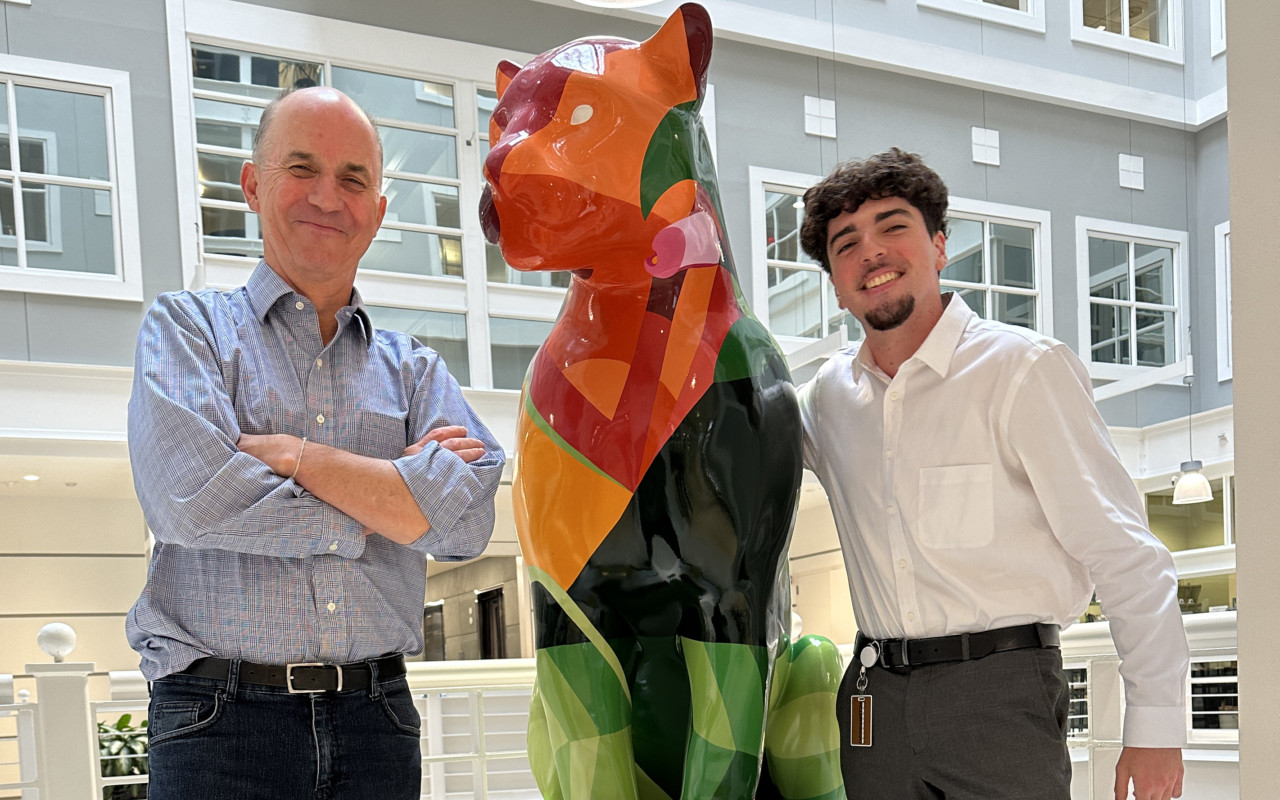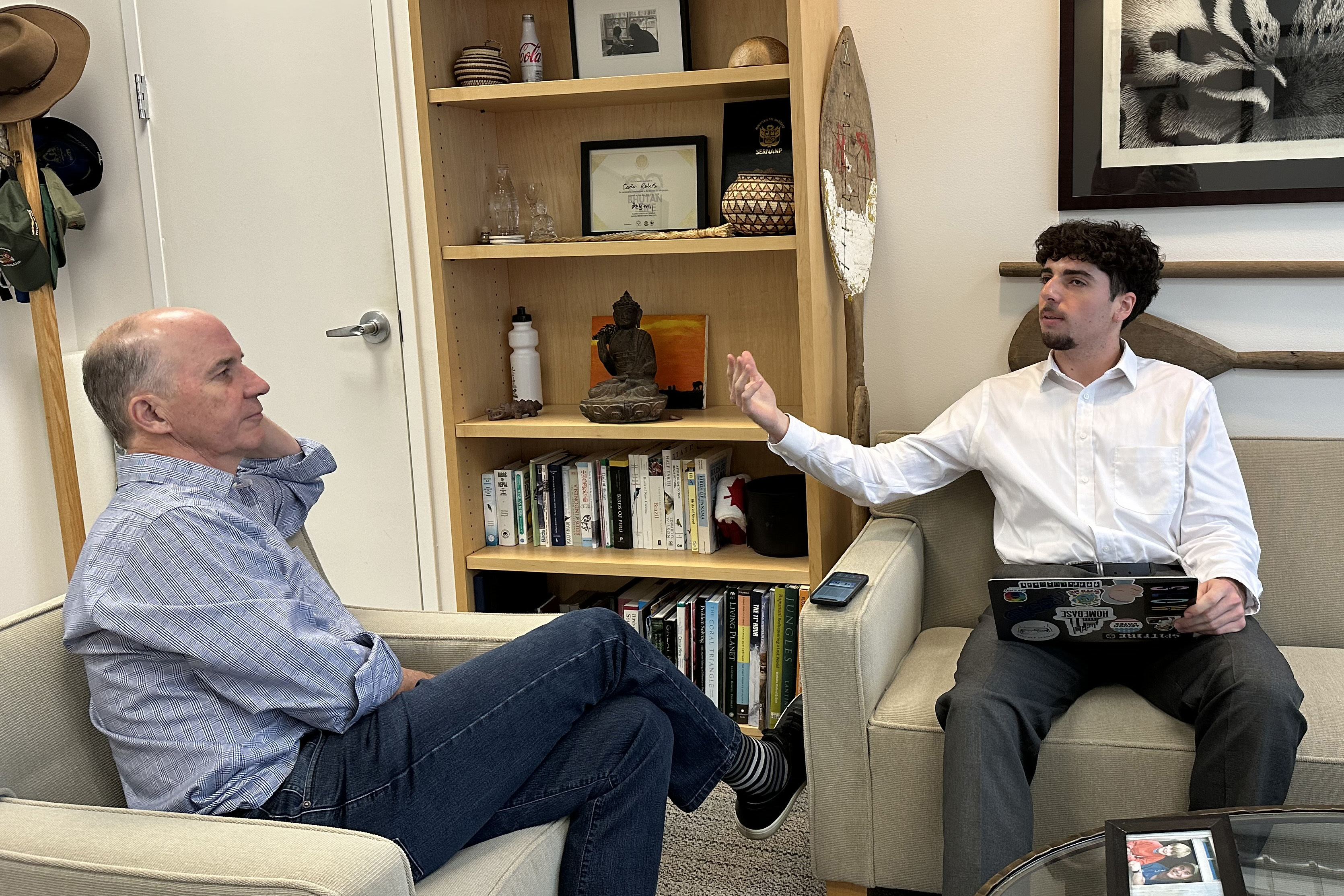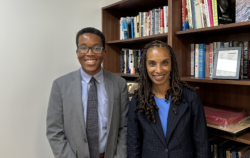
Ubben Posse Fellow Interviews: Carter Roberts
The Jeff Ubben Posse Fellows Program awards five exceptional Posse Scholars $10,000 each and the chance to spend 4-6 weeks during the summer shadowing and learning from a major industry leader. The interview below with Carter Roberts, CEO of the World Wildlife Fund, was conducted by Posse Scholar Ciaran Buitrago, now in his junior year at Lehigh University, who worked with Carter Robets as a 2023 Jeff Ubben Posse Fellow. The conversation has been edited and condensed.
CIARAN: Tell me about your childhood and your parents. How do you think they shaped your career and your leadership style?
CARTER ROBERTS: My parents could not have been more different. My dad was a surgeon who ran a residency program, operated clinics, and taught doctors all around the world to do certain operations that enable kids with birth defects to walk again. He taught himself until the day he died about almost every topic you could imagine – from politics, to history, to science, to AI. So, my dad was brainy, curious, and hardcore about healing children. He was single minded about impact. I acquired from him a kind of burning intensity to serve something that’s larger than myself. And his other word of advice: the secret to happiness is to be constantly learning.
My mother, on the other hand, studied design, never met a stranger, was a big personality, and smoked a rhinestone pipe. Back in the South where I grew up, we would go “visiting.” Which, in Georgia, meant we would show up unannounced at people’s homes. I would sit there with all sorts of people I hardly knew and make conversation, usually over cheese straws and pickled okra. My mother taught me how to talk to anybody, to treat everybody as important, to just be at ease with complete strangers. My mother also loved animals. So early on, I acquired from her an absolute love of people and of nature.
I have this kind of yin and yang between my dad’s intensity for learning and service, and my mom’s absolute love of people and animals.
Tell me about a challenge you had to face as a leader. How did you overcome it? What lessons did you learn from it?
There was a particular moment in time when we faced two challenges that impacted our ability to accomplish our mission. First, it became clear that we needed to shift leadership and responsibility to the Global South. Second, our spectacularly constrained and restrictive budget, which obstructed our ability to innovate and to jump on openings before we could raise the outside funds for them. So, we needed a depended source of unrestricted money that could be deployed against big new opportunities. You can’t do both of those things – decentralization and innovation – by simply finding new money for one year; you’ve got to do it by finding unrestricted money on an ongoing basis. We found the only way we could do that was to make our organization smaller.
The process of becoming smaller without immediate financial reasons is extremely hard. People understand hard decisions when the bottom falls out financially, and you’ve got to lay off people. But when you do it instead because of the imperative for innovation to move leadership to the Global South, it requires a lot of engagement – and even then, it is seen by some as causing unnecessary pain and suffering.
The way we managed to do it was to map out our priorities as an institution. If you weren’t already working on a priority, you were given an opportunity to apply to new jobs elsewhere. For the people who ended up leaving the organization, we armed them with long transition periods, career counseling, and all kinds of support along the way so they could land safely.
Just going through that whole process was immensely painful. For years we received criticism for taking these steps. But in the years that followed, we ended up unleashing a period of great innovation. We also did the right thing in moving jobs and resources to the Global South. And then we regained momentum and were able to sustain these shifts with more lasting structural shifts in our fundraising and organizational structure.

There is a difference between operating in the nonprofit sector versus the private sector. You have had the unique experience of having worked in both. How does being a leader in the nonprofit space differ from the private sector?
I started my career working for some very large companies. In these roles, I learned the profound importance of setting goals, measuring progress toward those goals, and being really clear about priorities. You can’t have 10 or 20 priorities – that’s an oxymoron. I was schooled in the rule of threes by my mentors in both the private sector and the public sector. Three priorities or goals is something you can remember and rally people around in making changes and making hard decisions.
As a leader in the nonprofit sector, goals matter at NGOs because people are more deeply attached. After all, this is not just a job for people; it’s their passion and their life’s work. You need to acquire the ability to listen more than you talk, and to bring people along. There’s more of a culture of consensus in the nonprofit sector. So, you have to set priorities in a way that also acknowledges the importance of the efforts of everyone in the institution. You look for a blend of financial and non-financial incentives – of which there are many – varying from the satisfaction of serving a cause larger than you are, constant learning, and brilliant colleagues. You are constrained only by the power of your ideas and how much money you can raise.
In the nonprofit sector, measuring results is possible, but harder. How do you measure the complexity of ocean ecosystems, the Amazon, supply chains, Indigenous cultures, solving climate change across 196 countries? You need to acquire the ability to think of the whole, which means understanding all of those disciplines I just mentioned and squeezing out the right points of intervention to keep the whole intact, almost like acupuncture. So that mindset of absorbing immense amounts of information, understanding the intricacy of the whole, and then making hard decisions to keep the whole intact is something I love.
When it comes to conservation and working with the private sector, sometimes making the right decision for the planet is not always profitable. What leadership techniques have you learned to work with the private sector on making progress, when it might harm their bottom line initially?
Every company on Earth is under pressure right now to reduce their greenhouse gas emissions and contribute to solving climate change. They’re under pressure because of all the reasons we already know: nations disappearing underwater in the Pacific, hundreds of millions of marginalized people in coastal areas that are at risk. The World Economic Forum has identified environmental loss and climate change as the top long-term risks to the global economy. And yet addressing those risks means spending money – lots of it – in the near term, and it means making substantive changes in the way businesses operate. At the same time, it means immense opportunities for those who see the future and become leaders in offering what the world increasingly needs.
At the end of the day, the way you get over that hump with companies is by engaging their leadership to make science-based commitments on climate change, protections, emissions, and reductions. If companies don’t get that right, they’ll lose their license to operate in different countries, they’ll lose some of their customers, and they’re going to lose some of their investors. For us, it starts with working with companies to set their targets. And then it moves to working with them on creating the right solutions and implementation and then helping them find ways to get there.
The best companies are moving swiftly. The worst companies will only move if the government makes them move. So positive incentives, collaboration, and meaningful regulations are the prize. And we’re seeing that happen all around the world.
Considering this era of climate crisis, widening political polarization, and increasing inequality, what do you think the next generation of leaders should look like? As my generation moves up into leadership positions, what traits should we possess and why?
Leaders must have the ability to be bridge builders, and solutions oriented, and capable of looking past the black and white rhetoric of the world and effecting transitions in the many shades of gray in between. It also means acquiring the ability to focus on doing the right thing. You will have political advisors, marketing advisors, strategy advisors telling you how to play to different audiences. You have to cultivate the ability to see through all that and do the right thing. [That mindset] will carry you through all kinds of really difficult situations.
And all of that, by the way, is on top of what we already talked about: cultivating the ability to look at the whole and then squeeze out decisions, the skills to mediate conflict in a world that’s increasingly divided across political parties, across gender, racial, and cultural divides, learning to listen and cultivating a sense of sympathy for the human condition—these are all fundamental.
Considering the stresses of your job, how do you avoid burning out?
First of all, never lose the ability to laugh or make other people laugh. That carries you through the worst. Avoid a transactional approach to relationships. Just enjoy other people, you learn a lot from them.
Build in time for yourself to learn and soak up the best parts of whatever work you do. Or you get burnt out. There’s a great quote by Edward Abbey, who wrote one of the bibles of the environmental movement called Desert Solitaire. He talks about the dangers of getting burned out while saving the planet.
[D]o not burn yourselves out. Be as I am – a reluctant enthusiast….a part-time crusader, a half-hearted fanatic. Save the other half of yourselves and your lives for pleasure and adventure. It is not enough to fight for the land; it is even more important to enjoy it. While you can. While it’s still here. […] Enjoy yourselves, keep your brain in your head and your head firmly attached to the body, the body active and alive, and I promise you this much; I promise you this one sweet victory over our enemies, over those desk-bound men and women with their hearts in a safe deposit box, and their eyes hypnotized by desk calculators. I promise you this; You will outlive the !@#$%.”
[Laughter]
Finally, there is the great joy of spending time with others and learning from them. You can’t run a hospital without spending time with patients. You can’t run a conservation organization without spending time with communities and the landscapes in the Northern Great Plains, or the Amazon, or the Heart of Africa. You have to soak up the stillness and brilliance of nature – in the mass migration of wildebeest, or clouds of tanagers in cloud forests in the Andes, or the impossibility of multicolored coral reefs in the Pacific.
There are these forms of compensation in this work that are magical. And it’s invaluable. It’s the joy and wonder of amazing people I meet from countries around the world and the sights and sounds and smells of the places we’re saving. And the constant imperative to innovate and to invent with smart clever people around the world. I’m just constantly learning. What could be better than that?

